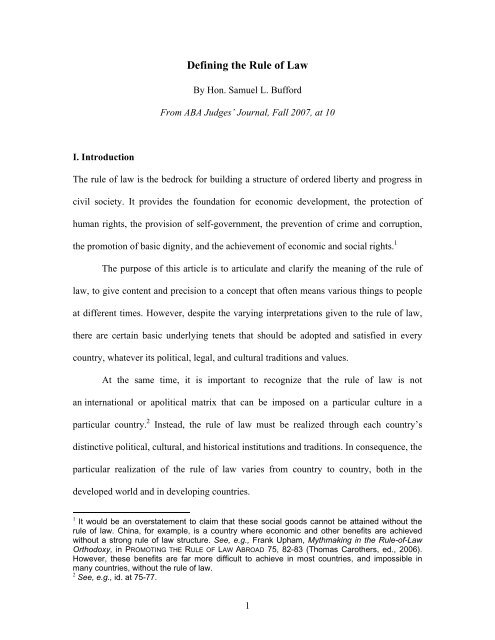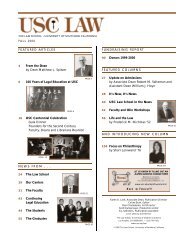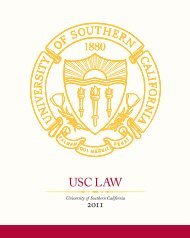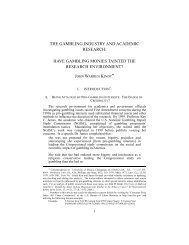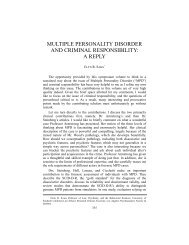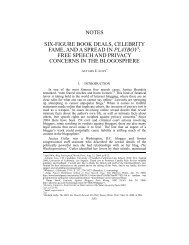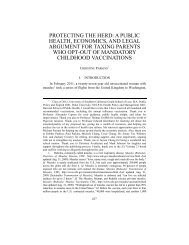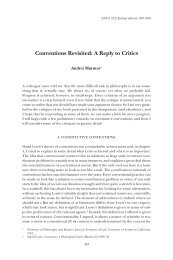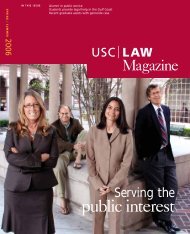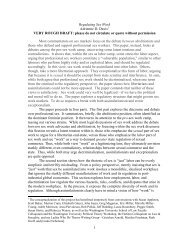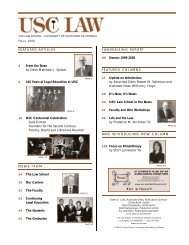Bufford Defining the Rule of Law
Bufford Defining the Rule of Law
Bufford Defining the Rule of Law
Create successful ePaper yourself
Turn your PDF publications into a flip-book with our unique Google optimized e-Paper software.
I. Introduction<br />
<strong>Defining</strong> <strong>the</strong> <strong>Rule</strong> <strong>of</strong> <strong>Law</strong><br />
By Hon. Samuel L. <strong>Bufford</strong><br />
From ABA Judges’ Journal, Fall 2007, at 10<br />
The rule <strong>of</strong> law is <strong>the</strong> bedrock for building a structure <strong>of</strong> ordered liberty and progress in<br />
civil society. It provides <strong>the</strong> foundation for economic development, <strong>the</strong> protection <strong>of</strong><br />
human rights, <strong>the</strong> provision <strong>of</strong> self-government, <strong>the</strong> prevention <strong>of</strong> crime and corruption,<br />
<strong>the</strong> promotion <strong>of</strong> basic dignity, and <strong>the</strong> achievement <strong>of</strong> economic and social rights. 1<br />
The purpose <strong>of</strong> this article is to articulate and clarify <strong>the</strong> meaning <strong>of</strong> <strong>the</strong> rule <strong>of</strong><br />
law, to give content and precision to a concept that <strong>of</strong>ten means various things to people<br />
at different times. However, despite <strong>the</strong> varying interpretations given to <strong>the</strong> rule <strong>of</strong> law,<br />
<strong>the</strong>re are certain basic underlying tenets that should be adopted and satisfied in every<br />
country, whatever its political, legal, and cultural traditions and values.<br />
At <strong>the</strong> same time, it is important to recognize that <strong>the</strong> rule <strong>of</strong> law is not<br />
an international or apolitical matrix that can be imposed on a particular culture in a<br />
particular country. 2 Instead, <strong>the</strong> rule <strong>of</strong> law must be realized through each country’s<br />
distinctive political, cultural, and historical institutions and traditions. In consequence, <strong>the</strong><br />
particular realization <strong>of</strong> <strong>the</strong> rule <strong>of</strong> law varies from country to country, both in <strong>the</strong><br />
developed world and in developing countries.<br />
1 It would be an overstatement to claim that <strong>the</strong>se social goods cannot be attained without <strong>the</strong><br />
rule <strong>of</strong> law. China, for example, is a country where economic and o<strong>the</strong>r benefits are achieved<br />
without a strong rule <strong>of</strong> law structure. See, e.g., Frank Upham, Mythmaking in <strong>the</strong> <strong>Rule</strong>-<strong>of</strong>-<strong>Law</strong><br />
Orthodoxy, in PROMOTING THE RULE OF LAW ABROAD 75, 82-83 (Thomas Caro<strong>the</strong>rs, ed., 2006).<br />
However, <strong>the</strong>se benefits are far more difficult to achieve in most countries, and impossible in<br />
many countries, without <strong>the</strong> rule <strong>of</strong> law.<br />
2 See, e.g., id. at 75-77.<br />
1
There is a rich literature on <strong>the</strong> definition <strong>of</strong> <strong>the</strong> rule <strong>of</strong> law, and this article does<br />
not attempt directly to enter <strong>the</strong> debate on <strong>the</strong> proper definition <strong>of</strong> <strong>the</strong> concept. 3 This<br />
article takes <strong>the</strong> position that <strong>the</strong> rule <strong>of</strong> law has both procedural and substantive<br />
dimensions, a view that is consistent with <strong>the</strong> American Bar Association’s (ABA) <strong>Rule</strong> <strong>of</strong><br />
<strong>Law</strong> Initiative to promote <strong>the</strong> rule <strong>of</strong> law throughout <strong>the</strong> world. The rule <strong>of</strong> law also has<br />
economic dimensions and special applications in times <strong>of</strong> crisis that have been articulated<br />
elsewhere and are beyond <strong>the</strong> scope <strong>of</strong> this article. 4<br />
It is important to recognize that <strong>the</strong> rule <strong>of</strong> law does not capture everything that is<br />
good and important in civil society. There are o<strong>the</strong>r values that nations should also strive<br />
to realize, such as economic growth, education, good governance, protection <strong>of</strong> <strong>the</strong><br />
environment, cultural development, and <strong>the</strong> preservation <strong>of</strong> cultural traditions.. 3 While<br />
adhering to <strong>the</strong> rule <strong>of</strong> law does not guarantee an effective government, economic<br />
development, or prosperity, it provides strong support for attaining <strong>the</strong>se goals.<br />
A. Short Definitions<br />
When discussing <strong>the</strong> rule <strong>of</strong> law, it is not feasible to specify in detail all <strong>of</strong> <strong>the</strong><br />
considerations articulated in <strong>the</strong> literature on this subject. To facilitate discussion,<br />
however, two short and abbreviated definitions may be useful. First, Justice Anthony<br />
3 See, e.g., Joel M. Ngugu, Policing Neo-Liberal Reforms: <strong>the</strong> <strong>Rule</strong> <strong>of</strong> <strong>Law</strong> as an Enabling and<br />
Restrictive Discourse, 26 U. PA. J. INT’L ECON. L. 513, 533-43 (2005) (describing three different<br />
kinds <strong>of</strong> definition for rule <strong>of</strong> law: a formal definition measuring a legal system against specified<br />
formal criteria; a substantive definition looking at substantive outcomes, such as justice and<br />
fairness, that is driven by a moral vision <strong>of</strong> <strong>the</strong> “good legal system;” and a function definition<br />
focusing on how well a legal system performs a specified function); Mat<strong>the</strong>w Stephenson, RULE<br />
OF LAW AS A GOAL OF DEVELOPMENT POLICY, World Bank, <strong>Law</strong> & Justice Institutions (2007).<br />
4 See, e.g., Samuel L. <strong>Bufford</strong>, International <strong>Rule</strong> <strong>of</strong> <strong>Law</strong> & <strong>the</strong> Market Economy, 12 SW. J.L. &<br />
TRADE AM. 303 (2006) (economic dimensions <strong>of</strong> <strong>the</strong> rule <strong>of</strong> law); Kim Askew, Opening Statement<br />
– Crisis Does Not Suspend <strong>the</strong> Constitution, LITIGATION, 1 (Spring 2007) (rule <strong>of</strong> law in times <strong>of</strong><br />
crisis).<br />
3 See U.N. Charter art. 62, para. 1; United Nations Educational, Scientific and Cultural<br />
Organization [UNESCO], Constitution, Nov. 16, 1945.<br />
2
Kennedy stated, in his 2006 address at <strong>the</strong> annual meeting <strong>of</strong> <strong>the</strong> ABA, that <strong>the</strong> rule <strong>of</strong><br />
law includes at least <strong>the</strong> following concepts:<br />
1. The <strong>Law</strong> is superior to, and thus binds, <strong>the</strong> government and<br />
all its <strong>of</strong>ficials.<br />
2. The <strong>Law</strong> must respect and preserve <strong>the</strong> dignity, equality,<br />
and human rights <strong>of</strong> all persons. To <strong>the</strong>se ends <strong>the</strong> <strong>Law</strong><br />
must establish and safeguard <strong>the</strong> constitutional structures<br />
necessary to build a free society in which all citizens have a<br />
meaningful voice in shaping and enacting <strong>the</strong> rules that<br />
govern <strong>the</strong>m.<br />
3. The <strong>Law</strong> must devise and maintain systems to advise all<br />
persons <strong>of</strong> <strong>the</strong>ir rights, and it must empower <strong>the</strong>m to fulfill<br />
just expectations and seek redress <strong>of</strong> grievances without<br />
fear <strong>of</strong> penalty or retaliation. 4<br />
Building on this articulation, <strong>the</strong> ABA World Justice Project has developed <strong>the</strong><br />
following working definition <strong>of</strong> <strong>the</strong> rule <strong>of</strong> law:<br />
The ABA’s advocacy <strong>of</strong> <strong>the</strong> importance <strong>of</strong> an independent<br />
judiciary in <strong>the</strong> administration <strong>of</strong> <strong>the</strong> <strong>Rule</strong> <strong>of</strong> <strong>Law</strong> contemplates a form <strong>of</strong><br />
government where <strong>the</strong> law is superior to, and thus binds, <strong>the</strong> government<br />
and all its <strong>of</strong>ficials. The law must respect and preserve <strong>the</strong> dignity,<br />
equality and human rights <strong>of</strong> all persons. To <strong>the</strong>se ends <strong>the</strong> law must<br />
establish and safeguard constitutional structures necessary to build a free<br />
society in which all citizens have a meaningful voice in shaping and<br />
enforcing <strong>the</strong> rules that govern <strong>the</strong>m. The law must devise and maintain<br />
systems to advise all persons <strong>of</strong> <strong>the</strong>ir rights, and it must empower <strong>the</strong>m to<br />
fulfill just expectations and seek redress <strong>of</strong> grievances without penalty or<br />
retaliation. There must be a general congruence between <strong>the</strong> laws as<br />
promulgated and as applied by <strong>the</strong> courts so that citizens may effectively<br />
guide <strong>the</strong>ir conduct.<br />
The ABA’s World Justice Project’s working definition <strong>of</strong> <strong>the</strong> <strong>Rule</strong><br />
<strong>of</strong> <strong>Law</strong> is based on four principles:<br />
1. A system <strong>of</strong> self-government in which all persons,<br />
including <strong>the</strong> government, are accountable under <strong>the</strong> law;<br />
2. A system based on fair, publicized, broadly understood and<br />
stable laws;<br />
3. A fair, robust and accessible legal process in which rights<br />
and responsibilities based in law are enforced; and<br />
4<br />
Anthony Kennedy, Associate Justice, United States Supreme Court, Address at <strong>the</strong> ABA Annual<br />
Convention (August 5, 2006).<br />
3
4. Diverse, competent and independent lawyers and judges. 5<br />
While <strong>the</strong>se short definitions are useful and capture some <strong>of</strong> <strong>the</strong> essence <strong>of</strong> <strong>the</strong><br />
concept <strong>of</strong> <strong>the</strong> rule <strong>of</strong> law, <strong>the</strong>re is much more that needs to be articulated.<br />
B. The Role <strong>of</strong> <strong>Law</strong>yers<br />
Although judges play a critical role in <strong>the</strong> effective functioning <strong>of</strong> a legal system,<br />
lawyers, more than anyone else, are <strong>the</strong> guardians <strong>of</strong> <strong>the</strong> rule <strong>of</strong> law. Indeed, lawyers<br />
ensure that laws are properly respected and fairly applied. 6 It is also lawyers who present<br />
cases in court, who provide <strong>the</strong> evidence needed for a court to decide a dispute, and who<br />
educate judges on <strong>the</strong> relevant law for deciding a case. It is lawyers who help clients<br />
structure transactions within <strong>the</strong> bounds <strong>of</strong> <strong>the</strong> law to achieve <strong>the</strong> desired results for <strong>the</strong>ir<br />
clients.<br />
II. Human Rights<br />
One central tenet <strong>of</strong> <strong>the</strong> rule <strong>of</strong> law is that every society must protect human rights and<br />
provide fundamental freedoms for its members (and for its visitors and guests).<br />
Internationally recognized human rights generally fall into two categories: civil and<br />
political rights, and economic and social rights.<br />
A. Civil and Political Rights<br />
The General Assembly <strong>of</strong> <strong>the</strong> United Nations adopted and proclaimed <strong>the</strong> Universal<br />
Declaration <strong>of</strong> Human Rights (hereinafter <strong>the</strong> Universal Declaration) on December 10,<br />
5 ABA <strong>Rule</strong> <strong>of</strong> <strong>Law</strong> Definition. (incomplete citation- date? Was this from an ABA report?)<br />
6 See Council <strong>of</strong> Bars and <strong>Law</strong> Societies <strong>of</strong> Europe [CCBE], Code <strong>of</strong> Conduct for <strong>Law</strong>yers in <strong>the</strong><br />
European Union, at 5 (Oct. 28, 1988), http://www.ccbe.org/doc/En/code2002_en.pdf; cf. CCBE,<br />
Resolution on Human Rights and <strong>the</strong> <strong>Rule</strong> <strong>of</strong> <strong>Law</strong>, (Nov. 27, 2004),<br />
http://www.ccbe.org/doc/En/ccbe_resolution_human_rights_en.pdf (resolving <strong>the</strong> importance <strong>of</strong><br />
lawyers in a society based on democracy and <strong>the</strong> rule <strong>of</strong> law); cf. Basic Principles on <strong>the</strong> Role <strong>of</strong><br />
<strong>Law</strong>yers, 13-14, U.N. Doc. ST/HR/ (Sept. 7, 1990) (describing <strong>the</strong> role and duties <strong>of</strong> lawyers in<br />
<strong>the</strong>ir effort to uphold human rights and freedoms), available at<br />
http://www.hri.ca/uninfo/treaties/44.shtml.<br />
4
1948. 7 In this Declaration, <strong>the</strong> United Nations stated that, “recognition <strong>of</strong> <strong>the</strong> inherent<br />
dignity and equal and inalienable rights <strong>of</strong> all members <strong>of</strong> <strong>the</strong> human family is <strong>the</strong><br />
foundation <strong>of</strong> freedom, justice and peace in <strong>the</strong> world . . . .” 8 The United Nations has also<br />
sponsored <strong>the</strong> International Covenant on Civil and Political Rights, 9 which toge<strong>the</strong>r with<br />
<strong>the</strong> Universal Declaration has inspired a substantial number <strong>of</strong> additional regional<br />
declarations <strong>of</strong> human rights, including covenants addressing particular human rights in<br />
greater detail.<br />
While many <strong>of</strong> <strong>the</strong> rights declared in <strong>the</strong>se documents are aspirational, most are<br />
considered core rights that must be protected by <strong>the</strong> legal system <strong>of</strong> any well-ordered<br />
society. 10 These rights include: <strong>the</strong> recognition that all human beings are born free and<br />
equal in dignity and rights; 11 that everyone has <strong>the</strong> right to life, liberty, and security <strong>of</strong><br />
person; 12 that nobody should be held in involuntary servitude, and that slavery and <strong>the</strong><br />
slave trade should be abolished; 13 that no person should be subjected to torture or to<br />
7 Universal Declaration <strong>of</strong> Human Rights, G.A. Res. 217A, at 71, U.N. GAOR, 3d Sess., 1 st plen.<br />
mtg., U.N. Doc A/810 (Dec. 12, 1948) [hereinafter Universal Declaration].<br />
8 Id. at pmbl.<br />
9 International Covenant on Civil and Political Rights, G.A. Res. 2200A, U.N. GAOR, U.N. Doc.<br />
A/6316 (1966), 999 U.N.T.S. 171 (Dec. 16, 1966) [hereinafter Civil and Political Rights].<br />
10 See Universal Declaration, supra note 9 (“human rights should be protected by <strong>the</strong> <strong>Rule</strong> <strong>of</strong><br />
<strong>Law</strong>”); Charter <strong>of</strong> Fundamental Rights <strong>of</strong> <strong>the</strong> European Union, pmbl., 200 J.O. (C 364)<br />
[hereinafter Fundamental Rights <strong>of</strong> <strong>the</strong> EU]; Convention for <strong>the</strong> Protection <strong>of</strong> Human Rights and<br />
Fundamental Freedoms, pmbl., E.T.S. 005, 213 U.N.T.S. 222 (Nov. 4, 1950) [hereinafter<br />
Fundamental Freedoms].<br />
11 See Universal Declaration, supra note 9, art. 1<br />
12 See id. art. 3; Fundamental Freedoms, supra note 12, at art. 5; Civil and Political Rights, supra<br />
note 11, art. 9; See Fundamental Rights <strong>of</strong> <strong>the</strong> EU, supra note 12, art. 6; League <strong>of</strong> Arab States,<br />
Arab Charter on Human Rights, art. 5, reprinted in 18 HUM. RTS. L.J. 151 (1997) [hereinafter Arab<br />
Charter]; Organization <strong>of</strong> American States, American Declaration <strong>of</strong> <strong>the</strong> Rights and Duties <strong>of</strong><br />
Man, art. 1, May 2, 1948, O.A.S. Res. XXX [hereinafter American Declaration].<br />
13 See Universal Declaration, supra note 9, art. 4; Supplementary Convention on <strong>the</strong> Abolition <strong>of</strong><br />
Slavery, <strong>the</strong> Slave Trade, and Institutions and Practices Similar to Slavery, April 30, 1956, 226<br />
U.N.T.S. 3; Civil and Political Rights, supra note 11, art. 8; Fundamental Freedoms, supra note<br />
12, art. 4; Fundamental Rights <strong>of</strong> <strong>the</strong> EU, supra note 12, art. 5; Organization <strong>of</strong> American States,<br />
American Convention on Human Rights, art. 6, Nov. 22, 1969, O.A.S.T.S. 36, 1144 U.N.T.S. 123<br />
[hereinafter American Convention]; African Union, African (Banjul) Charter on Human and<br />
5
cruel, inhuman, or degrading treatment or punishment; 14 that everyone has <strong>the</strong> right to<br />
recognition as a person before <strong>the</strong> law; 15 that all are equal before <strong>the</strong> law and entitled to<br />
<strong>the</strong> equal protection <strong>of</strong> <strong>the</strong> laws without discrimination; 16 that everyone has <strong>the</strong> right to<br />
freedom <strong>of</strong> movement and residence within a country, and to leave and return to any<br />
country (including her own country); 17 that everyone has <strong>the</strong> right to seek asylum in<br />
appropriate circumstances; 18 and that everyone has a right to a nationality. 19 Ins<strong>of</strong>ar as<br />
feasible, <strong>the</strong> rule <strong>of</strong> law requires that disabled persons enjoy full and effective<br />
participation and inclusion in society, 20 and that <strong>the</strong> foregoing rights be recognized for<br />
<strong>the</strong>se individuals as well. 21<br />
Peoples’ Rights, AU Doc. CAB/LEG/67/3 rev. 5, 21 I.L.M. 58 (June 27, 1981) [hereinafter African<br />
Charter].<br />
14 See, e.g., Universal Declaration, supra note 9, art. 5; Convention against Torture and O<strong>the</strong>r<br />
Cruel, Inhuman or Degrading Treatment or Punishment, G.A. Res. 39/46, 39 GAOR Supp. (No.<br />
51) at 197, U.N. Doc. A/39/51 (Dec. 10, 1984); Civil and Political Rights, supra note 11, art. 7;<br />
Fundamental Freedoms, supra note 12, art. 3; Fundamental Rights <strong>of</strong> EU, supra note 15, art. 4;<br />
American Declaration, supra note 14, art. 5; Arab Charter, supra note 14, art. 1; African Charter,<br />
supra note 15, art. 15; Asian Human Rights Commission, Asian Human Rights Charter,<br />
http://material.ahrchk.net/charter/, art. 3.5 (May 17, 1998) [hereinafter Asian Charter].<br />
15 See Universal Declaration, supra note 9, art. 6; Fundamental Freedoms, supra note 12, art. 6;<br />
American Convention, supra note 15,( art. 3; Arab Charter, supra note 14, art. 18.<br />
16 See Universal Declaration, supra note 9, art. 7; Arab Charter, supra note 14, art. 2; African<br />
Charter, supra note 15, art. 3; Asian Charter, supra note 16, art. 5.2.<br />
17 See Universal Declaration, supra note 9, art. 13; Fourth Protocol to <strong>the</strong> Convention for <strong>the</strong><br />
Protection <strong>of</strong> Human Rights and Fundamental Freedoms art. 2, Sept. 16, 1963, E.T.S 046; Civil<br />
and Political Rights, supra note 11, art. 12; Fundamental Freedoms, supra note 12, art. 18;<br />
American Convention, supra note 15, art. 22; Arab Charter, supra note 14, art. 20-22; African<br />
Charter, supra note 15, art. 12(1); American Declaration, supra note 14, art. 8.<br />
18 See Universal Declaration, supra note 9, art. 14(1); Arab Charter, supra note 14, art. 23;<br />
African Charter, supra note 15, art. 12(3); American Declaration, supra note 14, art. 27.<br />
19 See Universal Declaration, supra note 9, art. 15(1); Arab Charter, supra note 14, art. 24;<br />
American Declaration, supra note 14, art. 19.<br />
20 See, e.g., International Convention on <strong>the</strong> Protection and Promotion <strong>of</strong> <strong>the</strong> Rights and Dignity<br />
<strong>of</strong> Persons with Disabilities, G.A. Res. 61/106, art. 3, (Aug. 25, 2006) [hereinafter Disabilities];<br />
Principles for <strong>the</strong> Protection <strong>of</strong> Persons with Mental Illnesses and <strong>the</strong> Improvement <strong>of</strong> Mental<br />
Health Care, G.A. Res. 46/119, principle 1 art. 4, U.N. Doc. A/46/49, (Dec. 17, 1991) [hereinafter<br />
Mental Health Care]; Declaration on <strong>the</strong> Rights <strong>of</strong> Disabled Persons, G.A. Res. 3447 (XXX), art.<br />
2, U.N. Doc. A/10034, (Dec. 9, 1975) [hereinafter Disabled Persons]; Fundamental Freedoms,<br />
supra note 12, art. 26; see generally Arab Charter, supra note 14, art. 41; African Charter, supra<br />
note 15, art. 18(4); Asian Charter, supra note 16, art. 11 (??).<br />
21 See Disabilities, supra note 22, arts. 3-5, 10-22; Mental Health Care, supra note 22, principle 1<br />
art. 5; Disabled Persons, supra note 22, art. 4; Declaration on <strong>the</strong> Rights <strong>of</strong> Mentally Retarded;<br />
Persons, G.A. Res. 2856 (XXVI), art. 1, U.N. Doc. A/8429 (Dec. 20, 1971); Fundamental<br />
6
The rule <strong>of</strong> law also provides that certain types <strong>of</strong> activity are not subject to state<br />
regulation. For example, everyone has <strong>the</strong> right to freedom <strong>of</strong> thought, conscience, and<br />
religion, including <strong>the</strong> right to practice a religion freely and to change one’s religion. 22<br />
The rule <strong>of</strong> law also provides that everyone has <strong>the</strong> right to freedom <strong>of</strong> opinion and<br />
expression, including <strong>the</strong> right to receive and impart information and ideas through any<br />
media without regard to national borders, 23 and recognizes a person’s right to peaceful<br />
assembly and association. 24 The rule <strong>of</strong> law requires not only <strong>the</strong> legal recognition <strong>of</strong><br />
<strong>the</strong>se rights, but also that governments conform <strong>the</strong>ir conduct so that <strong>the</strong>se rights are<br />
protected and not infringed by state action.<br />
The rule <strong>of</strong> law has special implications in <strong>the</strong> marriage and family context as<br />
well. First, it requires that every adult man and woman have a right to marry and to have<br />
a family, without any restrictions as to race, nationality, or religion. 25 Second, it requires<br />
that men and women have equal rights as to marrying, and equal rights during a marriage<br />
and at its dissolution. 26 Third, it requires that marriage be based on <strong>the</strong> free and full<br />
Freedoms, supra note 12, art. 26; see generally Arab Charter, supra note 14, art. 41; African<br />
Charter, supra note 15, art. 18(4); Asian Charter, supra note 16, art. 11. (??).<br />
22 See Universal Declaration, supra note 9, art. 18; Civil and Political Rights, supra note 11, art.<br />
18; Fundamental Freedoms, supra note 12, art. 9; Fundamental Rights <strong>of</strong> <strong>the</strong> EU, supra note 12,<br />
art. 10; American Convention, supra note 15, art. 12; Arab Charter, supra note 14, art. 26-27;<br />
African Charter, supra note 15, art. 8; Asian Charter, supra note 16, art. 6.3 (??); American<br />
Declaration, supra note 14, art. 3.<br />
23 See Universal Declaration, supra note 9, art. 19; Fundamental Freedoms, supra note 12, art.<br />
10; Fundamental Rights <strong>of</strong> <strong>the</strong> EU, supra note 12, art. 11; Arab Charter, supra note 14, art. 27;<br />
African Charter, supra note 15, art. 9; Asian Charter, supra note 16, art. 7.2 (??); American<br />
Convention, supra note 15, art. 13; American Declaration, supra note 14, art. 4.<br />
24 See Universal Declaration, supra note 9, art. 20(1); Civil and Political Rights, supra note 11, art.<br />
21-22; Fundamental Rights <strong>of</strong> <strong>the</strong> EU, supra note 12, art. 12; American Convention, supra note<br />
15, art. 15-16; Arab Charter, supra note 14, art. 28; African Charter, supra note 15, art. 10-11;<br />
Asian Charter, supra note 16; art. 15.2(f); American Declaration, supra note 14, art. 21.<br />
25 See Universal Declaration, supra note 9, art. 16(1); Fundamental Freedoms, supra note 12, art.<br />
12; Fundamental Rights <strong>of</strong> <strong>the</strong> EU, supra note 12, art. 9; American Convention, supra note 15,<br />
art. 17(2).<br />
26 See Universal Declaration, supra note 9, art. 16(1); Convention on <strong>the</strong> Elimination <strong>of</strong> All Forms<br />
<strong>of</strong> Discrimination against Women, G.A. Res. 34/180, art. 16 (Dec. 18, 1979) [hereinafter Women].<br />
7
consent <strong>of</strong> each spouse. 27 Mo<strong>the</strong>rhood and childhood are entitled to special protection<br />
and assistance, and all children are entitled to equal social protection, whe<strong>the</strong>r born<br />
within or out <strong>of</strong> wedlock. 28<br />
In addition, <strong>the</strong> rule <strong>of</strong> law requires <strong>the</strong> protection <strong>of</strong> <strong>the</strong> family as a fundamental<br />
group unit <strong>of</strong> society. 29 In this context, children must be protected against discrimination,<br />
including discrimination based on <strong>the</strong> status, activities, expressed opinions, or beliefs <strong>of</strong><br />
<strong>the</strong> parents, legal guardians, or family members. 30 Similarly, children must be protected<br />
from abuse, maltreatment or exploitation, 31 including sexual exploitation and abuse. 32<br />
Fur<strong>the</strong>rmore, each child should be provided an education 33 and medical services, 34<br />
ins<strong>of</strong>ar as feasible, and be protected from economic exploitation. 35<br />
B. Economic and Social Rights<br />
Economic and social rights have not received as much emphasis in U.S. thought as civil<br />
and political rights. None<strong>the</strong>less, <strong>the</strong>y are important values that receive international<br />
recognition as fundamental to human society. 36 For <strong>the</strong> most part, <strong>the</strong>se rights are<br />
27 See Universal Declaration, supra note 9, art. 16(2); Civil and Political Rights, supra note 11, art.<br />
23(3); Women, supra note 28, art. 16; American Convention, supra note 15, art. 17(3).<br />
28 See Universal Declaration, supra note 9, art. 25(2); Civil and Political Rights, supra note 11, art.<br />
23(4); American Convention, supra note 15, art. 17(4)(5), American Declaration, supra note 14,<br />
art. 7.<br />
29 See Universal Declaration, supra note 9, art. 16(3); Civil and Political Rights, supra note 11, art.<br />
33; Fundamental Rights <strong>of</strong> <strong>the</strong> EU, supra note 12, art. 33; American Convention, supra note 15,<br />
art. 17(1), Arab Charter, supra note 14, art. 38; African Charter, supra note 15, art. 18.<br />
30 See Convention on <strong>the</strong> Rights <strong>of</strong> <strong>the</strong> Child, G.A. Res. 44/25, art. 2, U.N. Doc. A/44/49, (Nov.<br />
20, 1989) [hereinafter Child].<br />
31 See id. art. 19; Civil and Political Rights, supra note 11, art. 24; Fundamental Freedoms, supra<br />
note 12, art. 24; American Declaration, supra note 14, art. 7; American Convention, supra note<br />
15, art. 19; Arab Charter, supra note 14, arts. 10(2), 33; African Charter, supra note 15, art. 18(3);<br />
Asian Charter, supra note 16, art. 10. (??)<br />
32 See Child, supra note 32, art. 34; Asian Charter, supra note 16, art. 10. (??)<br />
33 See Child, supra note 32, art. 28; Fundamental Freedoms, supra note 12, art. 14.<br />
34 See Child, supra note 32, art. 24.<br />
35 See Child, supra note 32, art. 32; Arab Charter, supra note 14, arts. 10(2), 34; Asian Charter,<br />
supra note 16, art. 10. (??)<br />
36 See International Covenant on Economic, Social and Cultural Rights, G.A. Res. 2200A (XXI),<br />
U.N. Doc. A/6316, 993 U.N.T.S. 3 (Dec. 16, 1966).<br />
8
aspirational, ra<strong>the</strong>r than mandatory, and depend on a nation’s level <strong>of</strong> economic<br />
development.<br />
Aspirational rights in <strong>the</strong> economic context include <strong>the</strong> right to work, to just and<br />
favorable conditions <strong>of</strong> employment, and to protection against unemployment; 37 <strong>the</strong> right<br />
to equal pay for equal work; 38 and <strong>the</strong> right to form and join trade unions. 39 The rule <strong>of</strong><br />
law also advocates <strong>the</strong> right to rest and leisure, including a reasonable limitation on<br />
working hours and periodic paid vacations. 40 O<strong>the</strong>r aspirational rights include a right to<br />
remuneration that ensures an adequate living standard sufficient to provide for <strong>the</strong> health<br />
and well-being <strong>of</strong> <strong>the</strong> worker and <strong>the</strong> worker’s family, including food, clothing, housing,<br />
and medical care, and <strong>the</strong> right to security in <strong>the</strong> event <strong>of</strong> unemployment, sickness,<br />
disability, widowhood, or old age. 41<br />
Finally, <strong>the</strong> rule <strong>of</strong> law provides that individuals have a right to an education,<br />
which should be free and mandatory at <strong>the</strong> elementary level, and equally accessible to all<br />
on <strong>the</strong> basis <strong>of</strong> merit at <strong>the</strong> higher and pr<strong>of</strong>essional levels. 42<br />
C. Protection <strong>of</strong> Minority Rights<br />
37<br />
See Universal Declaration, supra note 9, art. 23(1); Fundamental Rights <strong>of</strong> <strong>the</strong> EU, supra note<br />
12, art. 16.<br />
38<br />
See Universal Declaration, supra note 9 art. 23(2); Fundamental Rights <strong>of</strong> <strong>the</strong> EU, supra note<br />
12, art. 23, 27; African Charter, supra note 15, art. 15.<br />
39<br />
See Universal Declaration, supra note 9, art. 23(4); Civil and Political Rights, supra note 11, art.<br />
22(1); Fundamental Rights <strong>of</strong> <strong>the</strong> EU, supra note 12, art. 12(1); Fundamental Freedoms, supra<br />
note 12, art. 11; Arab Charter, supra note 14, art. 29; Asian Charter, supra note 16, art. 12.1. (??)<br />
40<br />
See Universal Declaration, supra note 9, art. 24; American Declaration, supra note 14, art. 15.<br />
41<br />
See Universal Declaration, supra note 9, arts. 23(3), 25(1); Arab Charter, supra note 14, art.<br />
30, 32; Asian Charter, supra note 16, art. 9.3 (??); American Declaration, supra note 14, arts. 14,<br />
16.<br />
42<br />
See Universal Declaration, supra note 9, art. 26(1); Protocol to <strong>the</strong> Convention for <strong>the</strong><br />
Protection <strong>of</strong> Human Rights and Fundamental Freedoms art. 2, Mar. 20, 1952, E.T.S 009<br />
[hereinafter Protocol to <strong>the</strong> Convention]; Fundamental Rights <strong>of</strong> <strong>the</strong> EU, supra note 12, art. 14;<br />
Arab Charter, supra note 14, art. 35, African Charter, supra note 15, art. 16, Asian Charter, supra<br />
note 16, art. 3.2 (??); American Declaration, supra note 14, art. 12.<br />
9
The vast majority <strong>of</strong> countries have ethnically diverse populations and ethnic minorities<br />
<strong>of</strong> significant size. Indeed, some <strong>of</strong> <strong>the</strong> worst recent civil wars have arisen because <strong>of</strong><br />
ethnic strife. The rule <strong>of</strong> law requires <strong>the</strong> protection <strong>of</strong> ethnic minorities and <strong>the</strong><br />
recognition <strong>of</strong> <strong>the</strong>ir rights to <strong>the</strong>ir ethnic identities. 43 It condemns any form <strong>of</strong><br />
discrimination against a person because <strong>of</strong> his or her ethnic identity. 44 Indeed, it may be<br />
necessary to provide special advantages to members <strong>of</strong> an ethnic minority to redress past<br />
discrimination and to guarantee equality <strong>of</strong> treatment and opportunity. In addition, any<br />
substantial ethnic minority must have a realistic opportunity to participate in a country’s<br />
government. 45<br />
III. Procedural Requirements for <strong>the</strong> <strong>Rule</strong> <strong>of</strong> <strong>Law</strong><br />
The rule <strong>of</strong> law also has extremely important procedural dimensions, in addition to <strong>the</strong><br />
foregoing substantive dimensions. It requires a set <strong>of</strong> rules that is known in advance, rules<br />
that are actually and fairly enforced, mechanisms to ensure proper application <strong>of</strong> <strong>the</strong> rules<br />
(but permit controlled departure from <strong>the</strong> rules where necessary), an independent judicial<br />
system to make binding decisions when conflicts in <strong>the</strong> application <strong>of</strong> <strong>the</strong> rules arise,<br />
and procedures for amending and revising <strong>the</strong> rules. 46<br />
A. Fairness and Due Process<br />
43<br />
See Civil and Political Rights, supra note 11, art. 27; Arab Charter, supra note 14, art. 37; Asian<br />
Charter, supra note 16, art. 6.1, 8.1 (??); Fundamental Freedoms, supra note 12, art. 14; see<br />
generally Fundamental Rights <strong>of</strong> <strong>the</strong> EU, supra note 12, art. 22; see generally International<br />
Convention on <strong>the</strong> Elimination <strong>of</strong> All Forms <strong>of</strong> Racial Discrimination, G.A. Res. 2106 (XX), Annex,<br />
U.N. Doc. A/6014 (Dec. 21, 1965) [hereinafter Discrimination].<br />
44<br />
Discrimination, supra note 45, art. 2(1)(e); Fundamental Rights <strong>of</strong> <strong>the</strong> EU, supra note 12, art.<br />
21; Twelfth Protocol to <strong>the</strong> Convention for <strong>the</strong> Protection <strong>of</strong> Human Rights and Fundamental<br />
Freedoms art. 1, Apr. 11, 2000, E.T.S. 177.<br />
45<br />
American Convention, supra note 15, art. 23; Arab Charter, supra note 14, art. 19, 33; African<br />
Charter, supra note 15, art. 13; American Declaration, supra note 14, art. 20.<br />
46<br />
See, e.g., Ibraham Shihata, THE WORLD BANK IN A CHANGING WORLD 85 (Franziska Tsch<strong>of</strong>en &<br />
Antoino R. Parra eds., 1991).<br />
10
To protect <strong>the</strong> substantive requirements <strong>of</strong> <strong>the</strong> rule <strong>of</strong> law, certain procedural<br />
requirements must be established, including <strong>the</strong> right to an effective remedy by<br />
competent domestic tribunals for acts violating a society’s fundamental freedoms. 47 The<br />
rule <strong>of</strong> law demands fairness in both <strong>the</strong> criminal and civil law context.<br />
1. Fairness in Criminal Procedures<br />
The rule <strong>of</strong> law plays a critical role in ensuring <strong>the</strong> fair treatment <strong>of</strong> prisoners<br />
and those accused <strong>of</strong> crimes. For example, members <strong>of</strong> <strong>the</strong> public, whe<strong>the</strong>r accused <strong>of</strong> a<br />
crime or not, must be protected from unreasonable searches and seizures. A government<br />
will quickly lose <strong>the</strong> respect <strong>of</strong> <strong>the</strong> public if it subjects persons to unreasonable searches<br />
<strong>of</strong> homes or <strong>the</strong> unreasonable seizure <strong>of</strong> personal property.<br />
a. Rights <strong>of</strong> <strong>the</strong> Accused<br />
The rule <strong>of</strong> law also imposes special requirements regarding how those accused <strong>of</strong><br />
crimes may be treated. For instance, it requires that no one shall be subjected to arbitrary<br />
arrest, detention or exile; 48 that anyone charged with a crime has a right to a fair and<br />
public hearing by an impartial tribunal; 49 that a person is presumed innocent until proven<br />
guilty, 50 and that a person has a full and fair opportunity to present a defense to criminal<br />
charges. 51<br />
47 See Universal Declaration, supra note 9, art. 8; Fundamental Rights <strong>of</strong> <strong>the</strong> EU, supra note 12,<br />
art. 47; American Declaration, supra note 14, art. 26.<br />
48 See Universal Declaration, supra note 9, art 9; Civil and Political Rights, supra note 11, art. 9;<br />
American Convention, supra note 15, art. 7(3); African Charter, supra note 15, art. 6; Asian<br />
Charter, supra note 16, art. 3.6, 14.3 (??); American Declaration, supra note 14, art. 25.<br />
49 See Universal Declaration, supra note 9, art. 10; Civil and Political Rights, supra note 11, art.<br />
2(3)(b), 14(1); Fundamental Rights <strong>of</strong> <strong>the</strong> EU, supra note 12, art. 47; American Convention, supra<br />
note 15, art. 1, 7(4); Asian Charter, supra note 16, art. 3.7 (??); American Declaration, supra note<br />
14, art. 18.<br />
50 See Universal Declaration, supra note 9, art. 11(1); First United Nations Congress on <strong>the</strong><br />
Prevention <strong>of</strong> Crime and <strong>the</strong> Treatment <strong>of</strong> Offenders, Aug. 30, 1955, United Nations Standard<br />
Minimum <strong>Rule</strong>s for <strong>the</strong> Treatment <strong>of</strong> Prisoners, art. 84(2), U.N. Doc A/CONF/611, annex I<br />
[hereinafter Treatment <strong>of</strong> Prisoners]; Body <strong>of</strong> Principles for <strong>the</strong> Protection <strong>of</strong> All Persons under<br />
Any Form <strong>of</strong> Detention or Imprisonment, G.A. Res. 43/173, principle 37, (Dec. 9, 1998)<br />
11
If a person is arrested, he or she must be promptly charged with a crime or be<br />
released; a lengthy detention without any criminal charge is inconsistent with <strong>the</strong> rule <strong>of</strong><br />
law. 52 In addition, once a person is charged with a crime, a prompt trial on <strong>the</strong> charges is<br />
required (unless <strong>the</strong> accused voluntarily consents to a delay in trial). 53 The rule <strong>of</strong> law<br />
also stipulates that a person must be eligible for release (on a reasonable bail,<br />
if appropriate) pending trial. 54<br />
b. Prisoner Rights<br />
Because prisoners are in <strong>the</strong> custody <strong>of</strong> <strong>the</strong> state, <strong>the</strong> rule <strong>of</strong> law requires <strong>the</strong> state<br />
to protect <strong>the</strong>m and provide for <strong>the</strong>ir well-being, which involves providing adequate food,<br />
shelter, and clothing, and <strong>of</strong>fering medical services as needed. 55 The rule <strong>of</strong> law also<br />
prohibits transferring a prisoner to a mental hospital without adequate documentation <strong>of</strong><br />
mental illness or incapacity, or subjecting a prisoner to psychotropic drugs without <strong>the</strong><br />
prisoner’s informed consent. 56 In addition, procedures consistent with due process must<br />
be followed before probation or parole for a person convicted <strong>of</strong> a crime may be revoked.<br />
[hereinafter Imprisonment]; Civil and Political Rights, supra note 11, art. 14(2); Fundamental<br />
Rights <strong>of</strong> <strong>the</strong> EU, supra note 12, art. 48; American Convention, supra note 15, art. 8(2); Arab<br />
Charter, supra note 14, art. 7; African Charter, supra note 15, art. 7; Asian Charter, supra note<br />
16, art. 3.7. (??)<br />
51 See Universal Declaration, supra note 9, art. 11(1); American Convention, supra note 15, art.<br />
7(5); African Charter, supra note 15, art. 7; Asian Charter, supra note 16, art. 3.7.<br />
52 See Imprisonment, supra note 52, principle 37; Civil and Political Rights, supra note 11, art.<br />
9(3); American Convention, supra note 15, art. 7(5)(6); Arab Charter, supra note 14, art. 8;<br />
African Charter, supra note 15, art. 7.<br />
53 See Imprisonment, supra note 52, principle 38.<br />
54 See Id. at principle 39; American Convention, supra note 15, art. 7(5).<br />
55 See generally Treatment <strong>of</strong> Prisoners, supra note 52; See Imprisonment, supra note 52,<br />
principle 24; Asian Charter, supra note 16, art. 14.2 (??)<br />
56 See Imprisonment, supra note 52, principle 22; Arab Charter, supra note 14, art. 13(b).<br />
12
Torturing a person in custody, whe<strong>the</strong>r or not <strong>the</strong> person has been convicted <strong>of</strong> a<br />
crime, is also prohibited. 57 Similarly, <strong>the</strong> rule <strong>of</strong> law prohibits imposing unreasonably<br />
harsh, cruel, or degrading punishment. 58<br />
2. Fairness in Civil Cases<br />
The rule <strong>of</strong> law requires that civil litigants, as well as criminal defendants, be<br />
treated fairly. The European Court <strong>of</strong> Justice has recognized that, in <strong>the</strong> commercial law<br />
context, <strong>the</strong> parties are entitled to “equality <strong>of</strong> arms,” which includes a right to be heard, a<br />
right to present one's evidence and arguments to <strong>the</strong> court, and a right to respond to <strong>the</strong><br />
evidence and arguments <strong>of</strong> <strong>the</strong> opponent. 59 These rights by necessity imply a right to<br />
adequate notice and time to prepare one's own evidence and arguments, and to respond to<br />
<strong>the</strong> opponent. 60 Beyond <strong>the</strong>se procedural requirements, <strong>the</strong> rule <strong>of</strong> law also requires a fair<br />
and impartial court where decisions are based on <strong>the</strong> evidence presented.<br />
B. Equality and Equal Protection <strong>of</strong> <strong>the</strong> <strong>Law</strong>s<br />
In addition to fairness, <strong>the</strong> rule <strong>of</strong> law requires that people be given equal protection<br />
under <strong>the</strong> laws, which means that <strong>the</strong> law must treat similarly those who are in similar<br />
situations. Discriminatory treatment <strong>of</strong> individuals based on <strong>the</strong>ir race, age, gender,<br />
national origin, wealth, or sexual orientation is prohibited.<br />
IV. Institutional Requirements for <strong>the</strong> <strong>Rule</strong> <strong>of</strong> <strong>Law</strong><br />
One <strong>of</strong> <strong>the</strong> foundations <strong>of</strong> <strong>the</strong> rule <strong>of</strong> law is that governmental institutions must provide a<br />
structure for <strong>the</strong> political, economic, social, and cultural sectors to carry out <strong>the</strong>ir<br />
57<br />
See Treatment <strong>of</strong> Prisoners, supra note 52, principle 6; Imprisonment, supra note 52, principle<br />
6; Fundamental Rights <strong>of</strong> <strong>the</strong> EU, supra note 12, at art. 4; Asian Charter, supra note 16, art.<br />
14.2.(??)<br />
58<br />
See Imprisonment, supra note 52, principle 1; Civil and Political Rights, supra note 11, art.<br />
10(1); Asian Charter, supra note 16, art. 14.2. (??)<br />
59<br />
See Case T-107/02, GE Betz Inc. v. Office for Harmonisation in <strong>the</strong> Internal Market, 2004<br />
E.C.R. II-1845 (paragraph 72).<br />
60<br />
Id.<br />
13
activities. These institutions must include governmental structures, laws, judicial systems,<br />
and administrative systems.<br />
One <strong>of</strong> <strong>the</strong> most important prerequisites for <strong>the</strong> rule <strong>of</strong> law is that a country must<br />
have an effective functioning government. In some countries <strong>the</strong> political order has<br />
broken down, and <strong>the</strong>re is no central governmental power. In o<strong>the</strong>r countries, <strong>the</strong>re are<br />
regions where <strong>the</strong> power <strong>of</strong> <strong>the</strong> state is not effective. In <strong>the</strong>se places, <strong>the</strong>re is no rule <strong>of</strong><br />
law.<br />
A. Self-Government<br />
The rule <strong>of</strong> law also has important implications for political rights. It provides that<br />
individuals must have a right to participate in national government, ei<strong>the</strong>r directly or<br />
through freely chosen representatives, 61 and that everyone must have a right <strong>of</strong> equal<br />
access to <strong>the</strong> government and to public service. 62 Government must be based on <strong>the</strong> will<br />
<strong>of</strong> <strong>the</strong> people, expressed through periodic elections by secret voting procedures featuring<br />
equal and universal suffrage. 63 The rule <strong>of</strong> law requires that persons have a right to vote<br />
in elections and that each person’s vote be counted equally.<br />
B. <strong>Law</strong>s<br />
Of course, <strong>the</strong> rule <strong>of</strong> law requires that a legal system must have laws as well as a<br />
constitution or basic law to serve as <strong>the</strong> legal framework for all o<strong>the</strong>r laws. It may also<br />
include such elements as a civil code, a commercial code, and rules <strong>of</strong> court. In addition,<br />
a system must have positive laws to protect legal rights and to provide procedures for<br />
61 See Universal Declaration, supra note 9; see Civil and Political Rights, supra note 11, art. 25;<br />
see American Declaration, supra note 14, art. XX; see also American Convention, supra art. 23.<br />
62 See Universal Declaration, supra note 9, art. 21(2); see Civil and Political Rights, supra note<br />
11, art. 25; see American Declaration, supra note 14, art. XX; see American Convention, supra<br />
note 15, art. 23.<br />
63 See Universal Declaration, supra note 9, art. 21(3); see Civil and Political Rights, supra note 11,<br />
art. 25; see Protocol to <strong>the</strong> Convention, supra note 44, art. 3; see also American Declaration,<br />
supra note 14, art. XX; see American Convention, supra note 15, art. 23.<br />
14
enforcing legitimate expectations. The rule <strong>of</strong> law requires that all government <strong>of</strong>ficials,<br />
especially those at <strong>the</strong> highest levels <strong>of</strong> government, be subject to <strong>the</strong> laws. 64<br />
1. Substantive Provisions<br />
Criminal laws are <strong>the</strong> most obvious substantive laws in a system providing for <strong>the</strong><br />
rule <strong>of</strong> law. These laws provide for punishment <strong>of</strong> <strong>the</strong> most egregious injuries to o<strong>the</strong>r<br />
people and to good order. The goal is to punish and deter criminal conduct so that<br />
aggrieved individuals are not tempted to mete out punishment <strong>the</strong>mselves. 65<br />
Substantive civil laws impose order on a wide variety <strong>of</strong> human endeavors, from<br />
entering into contracts to creating business and social organizations. The rule <strong>of</strong> law does<br />
not require any particular body <strong>of</strong> substantive laws, but instead requires applicable laws<br />
to govern activities that are important in a society, and to structure such activities for <strong>the</strong><br />
benefit <strong>of</strong> participants and to minimize <strong>the</strong> externalities that may arise <strong>the</strong>refrom.[Judge<br />
<strong>Bufford</strong>, could you please clarify what <strong>the</strong>se externalities are?] 66<br />
2. Procedural Features<br />
According to <strong>the</strong> rule <strong>of</strong> law, a society must have a reasonably stable system <strong>of</strong><br />
laws that is generally known by and made available to <strong>the</strong> public. <strong>Law</strong>s must be fair and<br />
applied equally to all citizens. It is especially important that individuals whose conduct<br />
is impacted by a law have reasonable access to <strong>the</strong> text <strong>of</strong> <strong>the</strong> law so that <strong>the</strong>y can<br />
conform <strong>the</strong>ir actions to <strong>the</strong> law’s requirements. 67<br />
64<br />
E.g., Statute <strong>of</strong> <strong>the</strong> International Criminal Court art. 27, U.N. Doc. A/CONF.183/9 (July 17,<br />
1998) [hereinafter Rome Statute].<br />
65<br />
See STANFORD H. KADISH & STEPHEN J. SCHULHOFER, CRIMINAL LAW AND ITS PROCESSES, 101-35<br />
(7th ed. 2001).<br />
66<br />
See Convention <strong>of</strong> 27 September 1968 on Jurisdiction and <strong>the</strong> Enforcement <strong>of</strong> Judgments in<br />
Civil and Commercial Matters, 1972 O.J. (L 299) [hereinafter Brussels Convention].<br />
67<br />
Cf. Convention for <strong>the</strong> Protection <strong>of</strong> Human Rights and Fundamental Freedoms art. 44, Nov. 4,<br />
1950, E.T.S 005, 213 U.N.T.S 222 (publishing final judgments) [hereinafter Fundamental<br />
Freedoms].<br />
15
The rule <strong>of</strong> law is promoted by a generally stable system <strong>of</strong> law. 68 It is especially<br />
important that laws have no retroactive deleterious effect. 69 This means that conduct that<br />
was legal at <strong>the</strong> time it was undertaken, even if later prohibited by <strong>the</strong> legislature, must be<br />
protected.<br />
C. Judicial System<br />
An effective and independent judicial system is necessary to resolve business and o<strong>the</strong>r<br />
disputes (including disputes over governmental regulation) that arise. Such a system must<br />
provide independent judicial decisions, reasonable access to justice, and must not impose<br />
unreasonable costs on <strong>the</strong> participants. No person or institution should be “above <strong>the</strong> law”<br />
and exempted from its requirements.<br />
1. Judicial Independence<br />
Judicial independence is an essential cornerstone <strong>of</strong> <strong>the</strong> rule <strong>of</strong> law and for <strong>the</strong><br />
proper functioning <strong>of</strong> a market economy. A judicial system must promptly resolve<br />
disputes on <strong>the</strong>ir merits by an impartial judiciary, 70 as unreasonable delays seriously<br />
undermine <strong>the</strong> rule <strong>of</strong> law. The rule <strong>of</strong> law also requires at least some level <strong>of</strong> appellate<br />
review <strong>of</strong> judicial decisions to ensure proper interpretation and application <strong>of</strong> <strong>the</strong> laws. 71<br />
Judicial independence requires that judicial participation in politics<br />
be substantially circumscribed. While <strong>the</strong> law may permit a judge to be a member <strong>of</strong> a<br />
68<br />
See Paul Gewirtz, Independence and Accountability <strong>of</strong> Courts, 24 GLOBAL L. REV. 7 (2002)<br />
(published in Chinese but available in an English translation at<br />
http://www.law.yale.edu/documents/pdf/Ind_and_Acct_(English).pdf) (pointing out <strong>the</strong> value <strong>of</strong> a<br />
precedent system in giving a legal system predictability and reliability).<br />
69<br />
See Fundamental Freedoms, supra note 12, art. 7; see also Rome Statute, supra note 66, art.<br />
24(1); cf. id. art. 24(2) (applying more favorable law to person being investigated, prosecuted or<br />
convicted if <strong>the</strong>re is a change in law prior to final judgment).<br />
70<br />
See Fundamental Freedoms, supra note 12, art. 6; see also American Convention, supra note<br />
15, art. 8.<br />
71<br />
Cf. Statute <strong>of</strong> <strong>the</strong> Court <strong>of</strong> Justice <strong>of</strong> <strong>the</strong> European Union art. 4, January 2007,<br />
http://curia.europa.eu/en/instit/txtdocfr/txtsenvigueur/statut.pdf [hereinafter Court <strong>of</strong> Justice<br />
Statute] (allowing appeals from decisions <strong>of</strong> <strong>the</strong> Court <strong>of</strong> First Instance).<br />
16
political party, <strong>the</strong> law should prohibit a judge from running for political <strong>of</strong>fice.<br />
Similarly, judges should not engage in political fundraising or o<strong>the</strong>r clearly partisan<br />
activities.<br />
Fur<strong>the</strong>r, judicial independence requires that both an individual judge and <strong>the</strong><br />
system <strong>of</strong> justice be shielded from legislative reprisal for a judicial decision. In addition,<br />
legislatures must be prohibited from reducing a judge’s salary or benefits, or even<br />
reducting <strong>the</strong> funding <strong>of</strong> <strong>the</strong> judiciary generally, because <strong>of</strong> displeasure with particular<br />
judicial decisions.<br />
Reasonable access to courts requires that judicial business be conducted in<br />
public. 72 This requirement has two dimensions. First, both written judicial decisions and<br />
papers filed with courts must be available to <strong>the</strong> public when a reasonable request is<br />
made. 73 Second, courts must be open to <strong>the</strong> public so that citizens can see justice in action<br />
and be satisfied that court procedures are fair and equitable.<br />
The rule <strong>of</strong> law also requires that judges be competent. 74 This means that judges<br />
must meet minimum requirements in education, experience, moral standards, and judicial<br />
temperament. It also requires judges to continually keep abreast <strong>of</strong> new developments in<br />
<strong>the</strong> law, legal systems, and judicial procedures. Because laws and legal procedures<br />
change frequently, ongoing judicial education is <strong>the</strong>refore critical to ensuring that judges<br />
will be able to perform <strong>the</strong>ir judicial duties effectively.<br />
72 Thomas M. Riordan, Copping an Attitude: <strong>Rule</strong> <strong>of</strong> <strong>Law</strong> Lessons from <strong>the</strong> Rodney King Incident,<br />
27 LOY. L.A. L. REV. 675, 736 (1994) (citing GEOFFREY DE Q. WALKER, THE RULE OF LAW:<br />
FOUNDATION OF CONSTITUTIONAL DEMOCRACY 40 (1988)).<br />
73 It is appropriate to adopt measures to protect trade secrets and o<strong>the</strong>r confidential information.<br />
74 See Fundamental Freedoms, supra note 12, art. 21(1); see ECHR <strong>Rule</strong>s, supra note 100, <strong>Rule</strong><br />
3(1)(There is no note 100; not certain what this citation is referring to); see also Rome Statute,<br />
supra note 66, art. 3; see also Statute <strong>of</strong> <strong>the</strong> International Court <strong>of</strong> Justice art. 2, June 26, 1945,<br />
17 U.N.T.S. 111 [hereinafter ICJ Statute].<br />
17
The rule <strong>of</strong> law fur<strong>the</strong>r requires that no public <strong>of</strong>ficial be above <strong>the</strong> law or exempt<br />
from its requirements. While public <strong>of</strong>ficials enjoy a measure <strong>of</strong> immunity while working<br />
in <strong>the</strong>ir <strong>of</strong>ficial capacities, <strong>the</strong> rule <strong>of</strong> law requires that <strong>the</strong>y none<strong>the</strong>less be subject to <strong>the</strong><br />
same laws as every o<strong>the</strong>r individual outside <strong>the</strong> sphere <strong>of</strong> <strong>the</strong>ir <strong>of</strong>ficial duties.<br />
The rule <strong>of</strong> law also requires that <strong>the</strong> legal system give <strong>the</strong> impression or<br />
appearance to <strong>the</strong> public that it is doing justice. To accomplish this, those who administer<br />
justice must reflect <strong>the</strong> faces <strong>of</strong> <strong>the</strong> community. This means that judges, lawyers, and<br />
government <strong>of</strong>ficials must be men and women; <strong>the</strong>y must reflect <strong>the</strong> diversity <strong>of</strong> <strong>the</strong>ir<br />
communities; and <strong>the</strong>y must share <strong>the</strong> ethnic and religious backgrounds <strong>of</strong> those who use<br />
<strong>the</strong> judicial system. The rule <strong>of</strong> law is undermined if <strong>the</strong>se individuals have different<br />
religious beliefs, different ethnic backgrounds, and different colors <strong>of</strong> skin from those<br />
subject to <strong>the</strong> laws. The diversity in <strong>the</strong> legal pr<strong>of</strong>ession should mirror that <strong>of</strong> <strong>the</strong> society<br />
in which it operates. 75<br />
2. Judicial Ethics<br />
The rule <strong>of</strong> law requires that judges adhere to a higher standard <strong>of</strong> conduct than<br />
o<strong>the</strong>r pr<strong>of</strong>essions. Men and women who sit as judges must be exemplars <strong>of</strong> virtue and<br />
compliance with <strong>the</strong> law. 76 To ensure impartiality and fairness, <strong>the</strong> rules <strong>of</strong> judicial<br />
conduct must prohibit judges from hearing cases in which <strong>the</strong>y have a conflict <strong>of</strong><br />
interest. 77<br />
It goes without saying that <strong>the</strong> rule <strong>of</strong> law cannot survive in <strong>the</strong> face <strong>of</strong> judicial or<br />
governmental corruption. Unfortunately, corruption is rampant among <strong>of</strong>ficials in many<br />
75 E.g., Joy Milligan, Pluralism in America: Why Judicial Diversity Improves Legal Decisions About<br />
Political Morality, 81 N.Y.U. L. REV. 1206 (2006) (arguing that racial diversity in <strong>the</strong> judiciary<br />
improves legal decisions).<br />
76 See Rome Statute, supra note 66, art. 36(8).<br />
77 See, e.g., id. art. 3(a).<br />
18
countries. Where a judicial decision is for sale, justice cannot be provided. Fur<strong>the</strong>rmore, a<br />
country that tolerates judicial bribery will typically not thrive economically, because<br />
bribery bleeds assets from <strong>the</strong> economy, and both domestic and foreign investors may<br />
refuse to make investments in <strong>the</strong> country. 80<br />
3. Enforcement <strong>of</strong> Judgments<br />
One <strong>of</strong> <strong>the</strong> most important shortcomings in <strong>the</strong> laws <strong>of</strong> developing countries is <strong>the</strong><br />
lack <strong>of</strong> effective procedures to enforce judicial orders. 78 The lack <strong>of</strong> effective<br />
enforcement procedures leads to a general disrespect for <strong>the</strong> laws and legal institutions,<br />
including courts and judges. It is vitally important that legal judgments be enforceable,<br />
and that those who lose in <strong>the</strong> courts be required to comply with court orders.<br />
V. Conclusion<br />
As stated at <strong>the</strong> outset <strong>of</strong> this article, <strong>the</strong> rule <strong>of</strong> law serves as <strong>the</strong> bedrock for building a<br />
structure <strong>of</strong> ordered liberty and progress in civil society. In this context, <strong>the</strong> rule <strong>of</strong> law<br />
provides a structure for <strong>the</strong> realization and protection <strong>of</strong> human rights and o<strong>the</strong>r civil,<br />
political, economic and social rights; it provides a structure for sound economic<br />
development; it provides for <strong>the</strong> fair and equal treatment <strong>of</strong> everyone under <strong>the</strong> law and<br />
<strong>the</strong> protection <strong>of</strong> procedural rights in both criminal and civil law contexts; and it ensures<br />
that institutions in <strong>the</strong> various branches <strong>of</strong> government will carry out <strong>the</strong>ir legislative,<br />
executive, or judicial functions effectively.<br />
The rule <strong>of</strong> law does not create a civil society. However, it provides a structure for<br />
<strong>the</strong> realization <strong>of</strong> a civil society where human efforts can bear fruit, where individuals can<br />
80 See Tatyana Khavanska, Corruption and <strong>the</strong> Ukrainian Economy, COMMERCE MAGAZINE, March 2007,<br />
at 14 (“Corruption distorts economic decision-making and deters investment, undermines competitiveness<br />
and,ultimately weakens economic growth.”).<br />
78 See Fundamental Freedoms, supra note 12, art. 46.<br />
19
plan ahead and organize <strong>the</strong>ir efforts to achieve important goals, and where human values<br />
can be realized to a reasonable extent.<br />
Judge Samuel L. <strong>Bufford</strong> has served since 1985 as a United States bankruptcy judge in<br />
Los Angeles, in <strong>the</strong> Central District <strong>of</strong> California. He is chair-elect <strong>of</strong> <strong>the</strong> ABA National<br />
Conference <strong>of</strong> Federal Trial Judges.<br />
20


